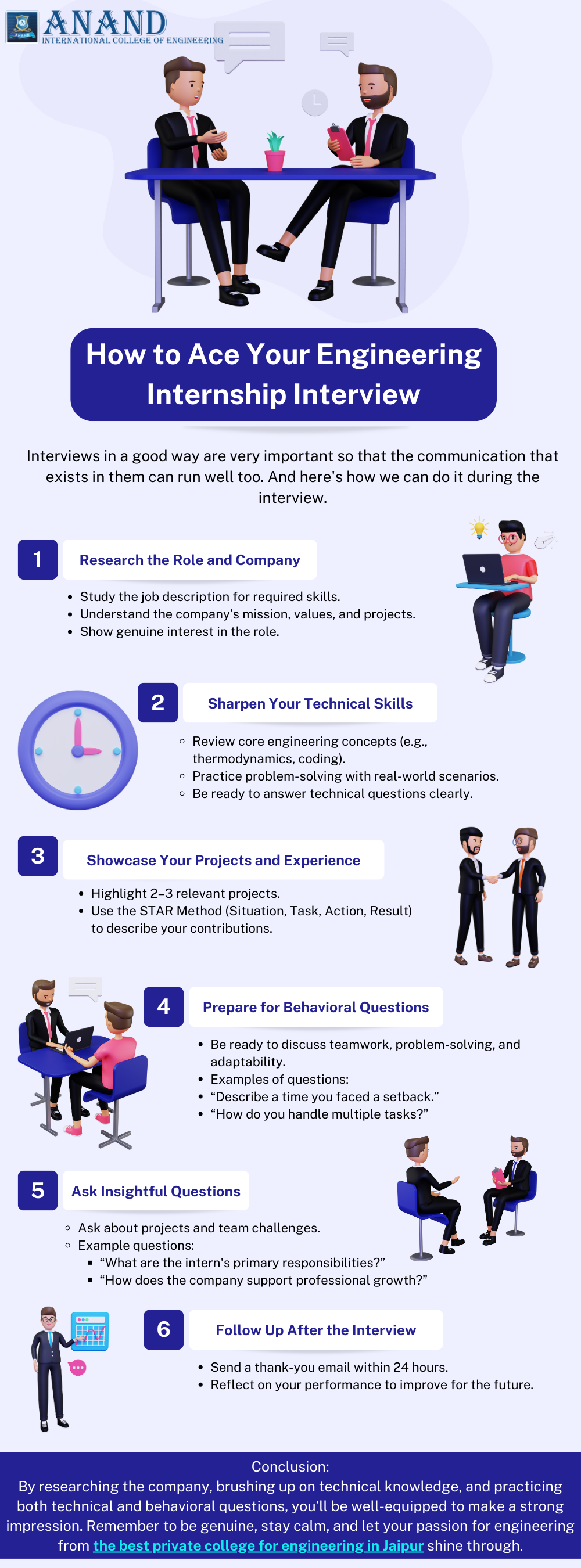An engineering internship is a crucial stepping stone toward building a successful career for the aspiring engineers from the top private college for engineering in Jaipur. It gives you practical experience, industry exposure and the chance to apply theoretical knowledge in real-world situations. However, before you can start learning on the job you have to pass the interview. Engineering internship interviews can be daunting especially if it’s your first one, but with the right preparation and mindset you can ace it.
This article will guide you through the key steps to help you succeed from understanding what interviewers are looking for to mastering technical questions and presenting yourself with confidence.
Key Steps to Succeed in Your Engineering Internship Interview
1. Understand the Role and the Company
Before stepping into an interview it is essential to know the company and the role you’re applying for. Employers want candidates who are genuinely interested in their work and not just seeking any internship.
Research the Company:
- History and Mission: Understand the company’s background mission and core values.
- Projects and Innovations: Familiarize yourself with any recent projects, products or innovations they’ve contributed to.
- Culture and Environment: Look up the company culture through reviews on platforms like Glassdoor or LinkedIn.
Understand the Job Description:
- Break down the job posting to identify the skills and qualifications required.
- Make a list of responsibilities mentioned and align them with your skills and experiences.
By showing that you’ve done your homework you will come across as a well-prepared and enthusiastic candidate.
2. Brush Up on Technical Knowledge
Engineering internship interviews often include technical questions designed to assess your understanding of core concepts. Whether it’s coding, circuit design, thermodynamics or manufacturing processes, be prepared to demonstrate your knowledge.
Tips to Prepare for Technical Questions:
- Review Fundamentals: Go over key concepts related to your field, such as mechanical engineering principles, electrical circuits, or software algorithms.
- Practice Problem-Solving: Work through practice problems on platforms like LeetCode, HackerRank, or industry-specific problems for mechanical, civil, or electrical engineering.
- Understand Common Tools and Software: Be familiar with industry-standard software like MATLAB, AutoCAD, SolidWorks, or Python, depending on your discipline.
3. Showcase Your Projects and Experiences
Employers want to see how you’ve applied your knowledge outside the classroom. Highlighting personal or academic projects, research work, or extracurricular activities can set you apart.
How to Talk About Your Projects:
- Describe the Problem: Briefly explain the problem you were solving.
- Explain Your Approach: Discuss how you tackled the problem, including any technical methods or tools used.
- Highlight the Outcome: Share the results and what you learned from the experience.
4. Prepare for Behavioral Questions
Behavioral questions assess your soft skills such as communication, teamwork and problem-solving.
Common Behavioral Questions:
- “Tell me about a time you faced a challenge and how you overcame it.”
- “Describe a situation where you had to work as part of a team.”
- “How do you handle tight deadlines or pressure?”
Use the STAR Method to Structure Your Answers:
- Situation: Describe the context.
- Task: Explain the challenge or task at hand.
- Action: Detail the actions you took to resolve it.
- Result: Share the outcome and what you learned.
5. Ask Insightful Questions
An interview isn’t just an opportunity for the employer to assess you but also your chance to evaluate if the role fits your goals. Asking thoughtful questions shows your engagement and curiosity.
Examples of Good Questions:
- “What kind of projects will I be working on during this internship?”
- “What does a typical day look like for an intern in this role?”
- “How does the company support interns in learning and development?”
Avoid asking questions with answers easily found on the company’s website. Instead focus on learning more about the role or team dynamics.
6. Present Yourself Professionally
First impressions matter and especially in a competitive environment like engineering. Professionalism is key from how you dress to how you communicate.
Tips for Professional Presentation:
- Dress Appropriately: Opt for business casual or formal attire depending on the company’s culture.
- Body Language: Maintain good posture, make eye contact and smile. These non-verbal cues convey confidence.
- Communication: Speak clearly, avoid jargon and be concise in your answers.
7. Follow Up After the Interview
A thoughtful follow-up can leave a lasting impression. Sending a thank-you email within 24 hours shows appreciation and reinforces your interest in the position.
What to Include in the Follow-Up Email:
- Thank the interviewer for their time.
- Reiterate your interest in the role and mention a specific topic discussed during the interview.
- Keep it brief and professional.
Conclusion
Acing your engineering internship interview requires preparation, confidence and a clear understanding of your strengths. By researching the company, brushing up on technical knowledge, and practicing both technical and behavioral questions, you’ll be well-equipped to make a strong impression. Remember to be genuine, stay calm, and let your passion for engineering from the best college for engineering in Jaipur shine through.


